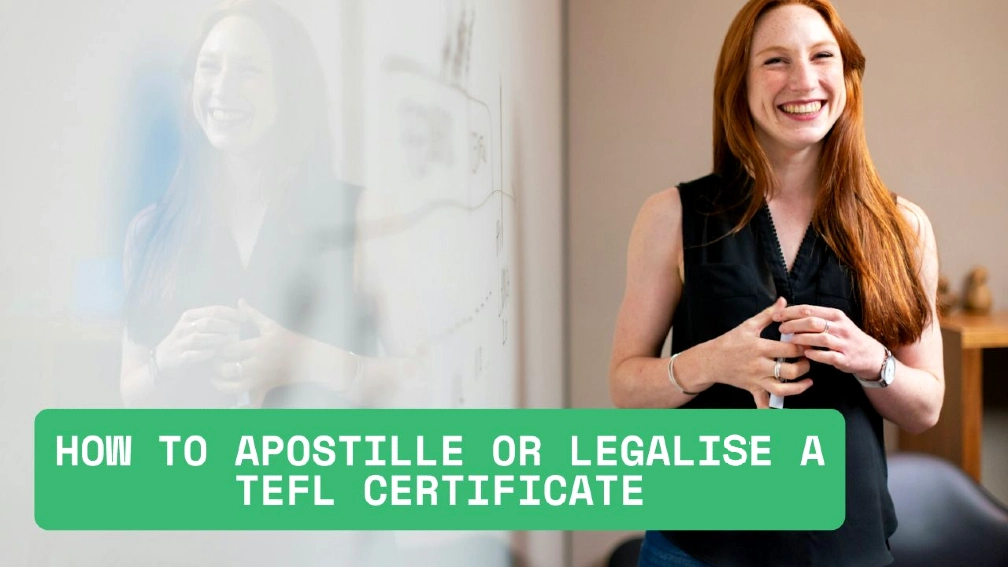So many people worldwide speak the English language, and some do it really well. They are ready to teach English to foreigners without problems. However, there are those who claim to be native speakers and teachers, while actually not being as skilled as needed for the job. The TEFL certificate solves this problem. If you want to teach abroad, this certificate is the best proof that you’re skilled to do it.

What is TEFL Certificate Legalisation?
Legalising a TEFL certificate is crucial when you’re about to teach abroad. Getting the certificate is one thing, but after you do it, you must legalise the document, which is enough proof for foreign governments that you’re eligible to do it.
Legalising a TEFL certificate means going to the notary and verifying the document, followed by an apostille from an agency issuing it or an embassy attestation. When you get these, you will be ready to legally teach the English language almost anywhere in the world.
Types of TEFL Legal Forms:
- Attestation: Attestation involves certifying your TEFL academy certificate with a solicitor certification or a notary stamp. This step confirms that your document is a true copy and meets the official requirements of the country. Many governments and employers insist on attested documents before you can legally teach English abroad.
- Notarisation: A notarisation ensures your TEFL certificate is formally recognised by a solicitor or notary public. Notarisation is often the first step in the legalisation process, especially if you need to present documents for work visas or consular applications. This step prevents delays caused by incorrect documents or incomplete certification.
- Apostille: An apostille certificate, also known as a Hague apostille, is required for countries that are part of the Hague Convention. Using an apostille service, your TEFL certificate is verified electronically or via government offices, making it legally valid abroad. This step is essential for teaching English in countries recognising the Hague apostille.

Why Do You Need to Attest Your TEFL Certificate?
Your employer and the government of the country you’re planning on working for will only accept legal documents proving you’re eligible for the job. The TEFL attestation legitimates your skills and qualifications. When you attest it, you’re ready to start working in Europe, Asia, Africa, or somewhere across the globe.
4 Steps to Legalise Your TEFL Certificate
To get your TEFL certificate legalised, you must be following this step-by-step guide that ensures smooth processing times and prevents common mistakes.
- Get it notarised (if required).
- Legalisation/apostille from the issuing country.
- Embassy attestation for the destination country.
- Translation if necessary.
Common Problems Without TEFL Attestation
You might be the best teacher and a native English language speaker, but you might face problems when working abroad as an English language teacher if you have no attestation. Your certificate may be rejected due to local laws and this will postpone your application. The employer might face problems paying you, you might miss the start of the school year, and many other issues, only because you didn’t attest to your certificate.
Get Your TEFL Certificate Legalised with Our Experts’ Help
Our legalisation office provides a full attestation service, including solicitor certification, apostille service, and embassy verification. We handle your documents for use internationally, ensuring they are certified correctly and delivered safely. Using courier or Royal Mail services, we return your legalised TEFL certificate efficiently, giving you peace of mind and the confidence to pursue teaching opportunities abroad.
FAQs
How Long Does the TEFL Attestation Process Take?
Processing times vary depending on the country and type of legalisation required. Typically, it can take several working days for notarisation, apostille certificates, and consular attestation. Using an experienced legalisation service can reduce delays and help you plan your international teaching timeline efficiently.
Do I need to attest both my TEFL and university degree for teaching abroad?
Yes. Many foreign governments require both your TEFL certificate and university degree documents legalised. This ensures your academic qualifications and TEFL course are recognised, particularly if you aim to secure a teaching job in competitive markets.
Can online TEFL certificates also be attested?
Online TEFL certificates can be attested, provided they come from an accredited TEFL academy. The process may involve solicitor certification and electronic submission to government offices. Always verify with the legalisation office if your online certificate is acceptable for international teaching.
Is TEFL attestation required if I already have a work visa?
In most cases, yes. A work visa does not automatically verify your qualifications for teaching English. Foreign governments and employers still require your TEFL academy certificate to be legalised, ensuring your documents for use are fully compliant with local regulations.
How much does it cost to attest a TEFL certificate?
Costs vary based on the type of attestation and the country where you plan to teach. Fees may include solicitor or notary charges, apostille service, consular fees, and courier delivery. Using a professional legalisation service ensures you understand all certificate needs and avoid unnecessary expenses.




